|
|
|
Sort Order |
|
|
|
Items / Page
|
|
|
|
|
|
|
| Srl | Item |
| 1 |
ID:
188842
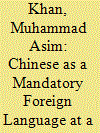

|
|
|
|
|
| Summary/Abstract |
Universities in Pakistan offer Chinese language courses to prepare students for ample employment-related opportunities in Pak-China projects, Chinese university scholarships, learner exchanges and mobility programmes. This article provides an interpretive policy analysis, focused on comparing the interpretations of policymakers and foreign language students concerning the aims and implementation of a mandatory Chinese language learning policy introduced at a major public engineering university in Pakistan. The findings reveal that while most aims stated in the policy artefacts match the stakeholders’ interpretations of the policy aims, the students’ interpretations differed slightly regarding policy implementation, mainly concerning the medium of instruction and class size, affecting student motivation and levels of learning. The article discusses to what extent such a policy entails implementation challenges.
|
|
|
|
|
|
|
|
|
|
|
|
|
|
|
|
| 2 |
ID:
188839
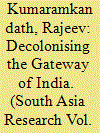

|
|
|
|
|
| Summary/Abstract |
This article interrogates how a colonial monument, the Gateway of India in Mumbai, former Bombay, continues to carry and be endowed with a title that is a misplaced embodiment of Indian social histories. Built in the 1920s, this monument, definitely a work of architectural grandeur, continues to carry its erroneous rendition and confines India’s vast social histories to the colonial moment, with an anglo-centric focus. As the monument symbolises the memory of the colonial regime, it also signifies its oppression as well as its exit from the subcontinent, rather than witnessing anyone coming to India, except King George in 1911, as the monument’s title seems to suggest. A mnemonic device of colonialism, this misleading label needs to be seriously revisited, for it not only romanticises the colonial past but also fails to lead our memories back to certain crucial episodes in earlier social histories, from which the monument and its specific place, Mumbai, are more or less fully absent.
|
|
|
|
|
|
|
|
|
|
|
|
|
|
|
|
| 3 |
ID:
188845
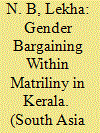

|
|
|
|
|
| Summary/Abstract |
This article presents ethnographic evidence to illustrate how Nayar women in Kerala from three different generations encounter the interplay of changed gender and property relations and seek to balance their relationships, expectations and entitlements within their natal and affinal families. Directly experiencing the dynamic intersection of property, gender and culture as well as legal and socio-cultural change, these women are seen to bargain, often quite consciously, over power and resources, including property, within patterns of matriliny that exist in a wider society influenced by dominant patriarchal norms. The article suggests that this is not as unique to Kerala as is often claimed. It makes a case, therefore, for further research on how South Asian women in the twenty-first century remain torn between matriliny and patriliny, the natal family and the husband’s family, and have to engage in multiple balancing acts to secure their rights.
|
|
|
|
|
|
|
|
|
|
|
|
|
|
|
|
| 4 |
ID:
188843


|
|
|
|
|
| Summary/Abstract |
The Second World War created numerous opportunities for intercultural encounters, including contacts between soldiers of the 2nd Polish Corps and the Gurkhas of the British Indian Army. This article focuses on a prominent single element highlighted in Polish war memoirs, the Gurkha khukuri knife. Used as a multi-purpose tool in Nepal, it contributes to the image of fierce Gurkha soldiers, thanks to its reputation as a lethal weapon. The Gurkha knife attracted much attention during the war and seems to have become the most-remembered element of the representation of Nepalis in the Polish Second World War memoirs.
|
|
|
|
|
|
|
|
|
|
|
|
|
|
|
|
| 5 |
ID:
188840
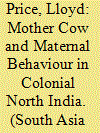

|
|
|
|
|
| Summary/Abstract |
This article offers a historical analysis of the interdisciplinary question to what extent animal behaviour influences domestication, by exploring how socio-cultural representations of cows as mothers were shaped by perceptions of their maternal behaviours. It does so by providing an analysis of the evolution of dairying practices in both the colonial and vernacular sciences of modern India. Mother cow (gau måtå) was imbibed with spiritual and material significance in the discourses of public health, food security and gastro-politics from the late nineteenth century. But to what extent were cultural representations influenced by the maternal behaviours of the cow? Analysing animal husbandry practices, it is shown here that in contrast to the Western tradition of segregating the mother from her calf, the maternal behaviours and emotions of Bos indicus zebu cows were perceived by many dairy farmers to be an evolved characteristic that needed to be nurtured.
|
|
|
|
|
|
|
|
|
|
|
|
|
|
|
|
| 6 |
ID:
188846
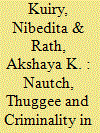

|
|
|
|
|
| Summary/Abstract |
Nineteenth-century colonial India witnessed the much-hyped anti-thuggee campaign, instrumental in creating an elaborate archive of frequent commentaries, opinions on banditry, prisoners and their trials, approvers’ accounts, administrative studies as well as fictional narratives. Re-reading such archival sources, this article explores how nautch, a hybrid form of dance, once glorified and later criminalised by the colonial powers, became a point of intersection between the Europeans in India and local thugs, who often benefitted from such dancers. The article shows the precarious position of the nautch performers as instrumental in collaborating with the colonial rulers and the outlawed thugs for controlling perceived ‘crime’ in the Indian subcontinent, while ending up as victims, too.
|
|
|
|
|
|
|
|
|
|
|
|
|
|
|
|
| 7 |
ID:
188841
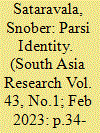

|
|
|
|
|
| Summary/Abstract |
This article discusses the politics of identity and narratives of the Parsi minority community in India, who are Indian Zoroastrians on the brink of extinction. The mapping of the mythical construction of the Parsis by the Parsis themselves is contrasted with representations by popular culture. The main concern is that when there are no more Parsis left in South Asia to participate in this dialogue regarding the manufacture of identity, unchallenged stereotypes will persist, to the disadvantage of the community. Specifically, the character of the mad Parsi (yeda) in Hindi cinema will remain predominant in popular imagination, while narratives of great Parsi entrepreneurs will be absorbed into general narratives of the nation, and collective memory will privilege the queer, the fool, the drug dealer or the anti-Christ.
|
|
|
|
|
|
|
|
|
|
|
|
|
|
|
|
| 8 |
ID:
188844


|
|
|
|
|
| Summary/Abstract |
The adverse impact of the COVID-19 pandemic on teachers and students has been discussed in different contexts of education, mostly focused on challenges of the imposed transition from physical to virtual teaching. Not much has been written about the resulting predicaments of rural teachers and their students, especially in developing countries like Bhutan. Using a qualitative approach, this article explores these challenges and identifies the coping strategies used by 15 Bhutanese rural teachers regarding online teaching during the COVID-19 pandemic. Possible implications and recommendations for future practice and research are discussed.
|
|
|
|
|
|
|
|
|
|
|
|
|
|
|
|
|
|
|
|
|